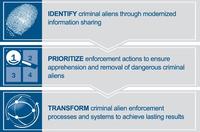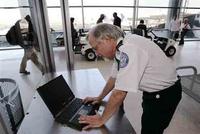-
Sector Report for Thursday, 14 July 2011: Border / Immigration control
This report contains the following stories.
Plus 1 additional story.
-
-
Judge orders DHS to clarify whether Secure Communities is mandatory

On Monday, a New York judge ordered federal immigration officials to provide clarification on whether or not states and local law enforcement agencies had the ability to opt out of the controversial Secure Communities immigration enforcement program; the judge’s ruling comes as part of a Freedom of Information Act lawsuit launched by several immigration and legal rights groups
-
-
Texas gets second UAV
Border agents in south Texas will be getting additional help thanks to the deployment of a second unmanned aerial vehicle (UAV) in the area; currently there are four UAVs deployed along the U.S.-Mexico border and three of them are based in Arizona; the second drone is expected to arrive later this year or in the early part of next year.
-
-
Tough new Alabama immigration law divides community
A sweeping new Alabama immigration law is generating sharp controversy and unease with many likening it to a return to the state’s brutal Jim Crow laws; among the strict immigration measures passed last month, undocumented immigrants are banned from enrolling in or attending college, applying for work, and landlords are restricted from renting property to illegal aliens; the law even requires school districts to check the immigration status of children; the bill has drawn fierce criticism from immigration advocates, churches, and civil liberties groups.
-
-
Senator Schumer demands release of northern counternarcotics strategy
Senator Charles Schumer (D-New York) is demanding that the Office of National Drug Control Policy (ONDCP) release its Northern Border Counternarcotics strategy immediately; the strategy was due on 5 July as stipulated by a law passed in January; the law came in response to a to a Government Accountability Office (GAO) report which found that only thirty-two miles along the nearly 4,000 mile U.S.-Canada border had “an acceptable level of security”
-
-
Boston threatens to withdraw from Secure Communities
On Monday Boston mayor Thomas M. Menino announced that he will withdraw the city from the controversial Secure Communities program unless changes are made; Boston was among the first cities in the United States to test the program in 2006, but now Mayor Menino is one of the many growing voices that have taken aim at the Secure Communities program
-
-
More than forty dead in Mexico in a weekend of violence
Over the weekend more than twenty people were killed in a hail of bullets in Monterrey, Mexico; last Friday gunmen open fired on a bar indiscriminately killing patrons and even the hot dog vendor outside; in a weekend filled with violence, eleven bodies with gunshot wounds were found on the outskirts of Mexico City and ten decapitated heads were found in Torreon
-
-
Can DHS seize -- and hold for months -- U.S. citizens' laptops?

On Friday, a federal judge heard arguments in a lawsuit that challenged the government’s right to search laptops, cell phones, and other electronic devices at the border and hold them indefinitely; civil liberties groups say the policy violates a travelers’ First Amendment right to free speech and the Fourth Amendment’s protection from unreasonable search and seizure; according to the civil liberties groups, more than 6,500 travelers have been subject to such search and seizure of their electronic devices from October 2008 to June 2010
-
-
North Carolina jail investigated for immigration violations
A jail in North Carolina is currently under federal investigation on charges that local law officers mistreated detainees held as part of an immigration enforcement program; the investigation comes at the request of the state’s American Civil Liberties Union (ACLU) which requested that DHS officials investigate the Wake County jail based on fifty-seven complaints made by individuals detained there in 2009 and 2010; the complaints stem from the 287(g) program which allows local police officers to enforce federal immigration laws
-
-
Sector Report for Thursday, 30 June 2011: Border / Immigration control
This report contains the following stories.
Plus 1 additional story.
-
-
Austin fights to keep federal money to battle cartels
With federal lawmakers struggling to reduce spending and cut the deficit, Austin, Texas, could lose as much as $2 million in federal grant money that it uses to combat Mexican drug cartels; on Tuesday, Austin police chief Art Acevedo and Representative Michael McCaul (R-Texas) urged lawmakers not to cut their funding citing the fact that the city is a dangerous hub for drug cartels
-
-
U.S. spends $90 billion on border security, drugs keep pouring in
A recent study found the United States has spent an estimated $90 billion over the past decade to secure the U.S - Mexico border with mixed results;annual border spending had tripled over the last decade; the increased spending has helped curb illegal immigration, but for Mexican drug cartels business is booming and they are smuggling more drugs than ever into the United States
-
-
Federal judge blocks Georgia's Arizona-style immigration law
On Monday, portions of a Georgia immigration law were blocked by a federal judge on the grounds that the role of enforcing immigration was a federal responsibility; under the law, all businesses in Georgia would be required to check the immigration status of all new hires, police officers would be able to verify the immigration status of anyone unable to provide proper identification during a routine stop, and it would be illegal for anyone to knowingly or willingly transport illegal aliens
-
-
Senate holds first DREAM Act hearing
On Tuesday the Senate held its first hearings on the DREAM Act, a bill first introduced in August 2001 to give children of illegal immigrants a path to U.S. citizenship if they attend college or serve in the U.S. military; the bill is not likely to pass as the Republicans control the House, but Democrats plan to continue pushing for the bill
-
-
Documents reveal drug cartels' secret weapons, techniques

The recent attack on Arizona’s Department of Public Safety by LulzSec has revealed that law enforcement officials in the Southwest are battling drug cartels that use a variety of sleek gadgets and hidden weapons; the sensitive documents published by LulzSec show that smugglers have become increasingly clever using a variety of methods to sneak drugs past border officials; the cartels have hollowed out cell phones to plant 180,000 volt stun guns or a .22 caliber pistol
-
- All
- Regional
- Water
- Biometrics
- Borders/Immig
- Business
- Cybersecurity
- Detection
- Disasters
- Government
- Infrastructure
- International
- Public health
- Public Safety
- Communication interoperabillity
- Emergency services
- Emergency medical services
- Fire
- First response
- IEDs
- Law Enforcement
- Law Enforcement Technology
- Military technology
- Nonlethal weapons
- Nuclear weapons
- Personal protection equipment
- Police
- Notification /alert systems
- Situational awareness
- Weapons systems
- Sci-Tech
- Sector Reports
- Surveillance
- Transportation
Advertising & Marketing: advertise@newswirepubs.com
Editorial: editor@newswirepubs.com
General: info@newswirepubs.com
2010-2011 © News Wire Publications, LLC News Wire Publications, LLC
220 Old Country Road | Suite 200 | Mineola | New York | 11501
Permissions and Policies
Editorial: editor@newswirepubs.com
General: info@newswirepubs.com
2010-2011 © News Wire Publications, LLC News Wire Publications, LLC
220 Old Country Road | Suite 200 | Mineola | New York | 11501
Permissions and Policies
